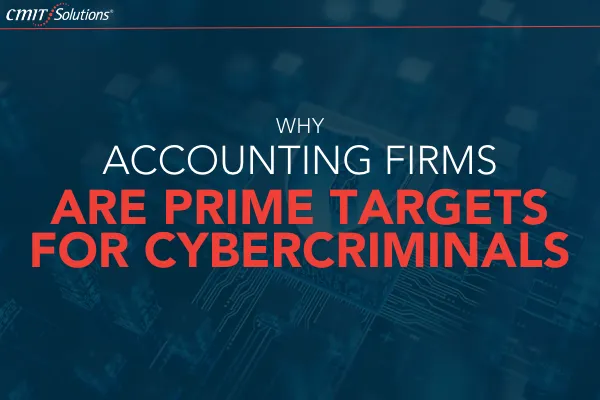See Our Latest Blogs
Stay updated with the latest trends and insights in IT managed services, cybersecurity, and digital transformation. Explore expert advice, practical tips, and innovative solutions to enhance your business efficiency and security on the CMIT Solutions blog

Why Accounting Firms are Prime Targets for Cybercriminals
Cybersecurity is no longer just a concern for large corporations; accounting firms. - even small single-location accounting firms are increasingly in the crosshairs of cybercriminals. These firms hold a treasure trove of sensitive financial data, personal information, and corporate secrets, making them prime targets for a wide range of cyberattacks. And with the rise of AI-driven threats, the stakes have never been higher.
The Value of Data: Why Cybercriminals Target Accounting Firms
Accounting firms manage some of the most valuable data in existence. From tax returns to financial statements, they hold the keys to a vast amount of personal and corporate information that cybercriminals find irresistible.
Sensitive Financial Information: Accounting firms handle a wealth of sensitive information, including Social Security numbers, bank account details, and credit card information. This data can be exploited in a multitude of ways—sold on the dark web, used for identity theft, or leveraged for financial fraud. For cybercriminals, this information is a goldmine, offering numerous avenues for illicit profit.
Corporate Secrets and Competitive Intelligence: Beyond personal data, accounting firms often manage confidential corporate financials, trade secrets, and strategic plans. Hackers can sell this data to competitors, use it for insider trading, or exploit it for corporate espionage. The potential damage to a firm’s clients is enormous, making the protection of this data paramount.
Regulatory Compliance Data: Many accounting firms are also responsible for managing data related to compliance with regulations like the General Data Protection Regulation (GDPR) or the Sarbanes-Oxley Act (SOX). Breaching this data not only causes immediate harm but also exposes the firm to significant fines and legal repercussions. Cybercriminals are well aware of this and target firms knowing the immense pressure they are under to maintain compliance.
Common Cybersecurity Threats Faced by Accounting Firms
Given the high value of the data they manage, it’s no surprise that accounting firms face a variety of cybersecurity threats. Understanding these threats is the first step in defending against them.
Phishing Attacks: Phishing remains one of the most effective tools in a cybercriminal’s arsenal. By impersonating trusted contacts through emails or other communication methods, attackers trick employees into revealing passwords, account numbers, or other sensitive information. Once inside, cybercriminals can wreak havoc, accessing client data, stealing funds, or planting malware.
Ransomware: Ransomware is particularly devastating for accounting firms. This type of malware encrypts a firm’s data, rendering it inaccessible until a ransom is paid. Given that accounting firms often work with tight deadlines, especially during tax season, a ransomware attack can bring operations to a grinding halt. The cost of downtime, combined with the potential loss of critical data, can be catastrophic. And even if the ransom is paid, there’s no guarantee the data will be restored.
Insider Threats: While external threats are a major concern, insider threats can be equally dangerous. Whether it’s a disgruntled employee intentionally leaking information or a well-meaning staff member making a critical error, the risk from within is real. Insider threats are particularly challenging because they often involve individuals with legitimate access to sensitive data, making them harder to detect and prevent.
The Rise of AI-Driven Attacks
As if these threats weren’t enough, the rise of AI-driven attacks has added a new layer of complexity to cybersecurity. Cybercriminals are increasingly using AI to enhance their attacks, making them more sophisticated, targeted, and difficult to defend against.
AI-Powered Phishing: AI can analyze vast amounts of data to craft highly personalized phishing emails that are nearly indistinguishable from legitimate communications. These AI-generated phishing attacks are more convincing and can trick even the most vigilant employees, increasing the likelihood of a successful breach.
Adaptive Malware: AI enables malware to learn from and adapt to the defenses it encounters. This means that traditional security measures, which rely on known patterns and signatures, are becoming less effective. AI-driven malware can morph its behavior to avoid detection, persist in systems longer, and cause more damage.
Automated Attacks: AI allows cybercriminals to automate attacks, launching them on a scale and speed that was previously impossible. For accounting firms, this means that a single vulnerability can be exploited multiple times in rapid succession, overwhelming their defenses.
Challenges Specific to Accounting Firms
Accounting firms face unique challenges that can make cybersecurity even more difficult to manage. These challenges, combined with the evolving nature of cyber threats, require a tailored approach to security.
Seasonal Workloads: The nature of accounting work is highly cyclical, with intense periods like tax season requiring long hours and a high volume of work. During these peak times, the focus is often on meeting deadlines rather than maintaining strict cybersecurity practices. This creates an environment where mistakes are more likely, and security protocols may be overlooked, leaving the firm vulnerable to attacks.
Multiple Client Data Sets: Unlike many businesses that manage their own data, accounting firms handle data from numerous clients, each with its own set of security needs and compliance requirements. This complexity makes it challenging to implement consistent cybersecurity measures across all client data. A breach in one client’s data could have ripple effects, potentially compromising the entire firm’s security.
Regulatory Compliance: Accounting firms are bound by various regulations that dictate how sensitive data must be handled and protected. Compliance with these regulations can be challenging, especially for smaller firms with limited resources. Failure to comply not only opens the firm up to cyberattacks but also to fines and legal action.
Best Practices for Protecting Accounting Firms
To defend against these increasingly sophisticated threats, accounting firms need to adopt a proactive approach to cybersecurity. Here are some best practices that can help:
Employee Training: The first line of defense against cyberattacks is a well-trained staff. Regular training sessions should be held to educate employees about the latest threats, such as AI-driven phishing, and to reinforce the importance of following security protocols. Employees should know how to recognize suspicious emails, use strong passwords, and avoid clicking on unverified links.
Regular Software Updates: Keeping software up to date is essential for protecting against vulnerabilities that cybercriminals can exploit. This includes not only accounting software but also operating systems, antivirus programs, and any other software used by the firm. Regular updates help close security gaps before they can be exploited by AI-driven or other advanced attacks.
Multi-Factor Authentication (MFA): MFA adds an extra layer of security by requiring two or more forms of verification before access is granted. Even if a cybercriminal manages to obtain a password, they would still need the second factor—such as a code sent to a mobile device—to gain access. This is particularly effective against AI-driven brute force attacks that attempt to crack passwords.
Data Encryption: Encrypting sensitive data ensures that even if it is intercepted by a cybercriminal, it cannot be easily read or used. Encryption should be applied to data both at rest (stored data) and in transit (data being sent over the internet). This adds a crucial layer of protection, especially against AI-enhanced hacking techniques.
Professional Cybersecurity Services: Given the complexity of managing cybersecurity, especially with the rise of AI-driven threats, many accounting firms find it beneficial to partner with a cybersecurity provider. We certified cybersecurity professionals provide continuous monitoring, threat detection, and incident response services, ensuring that our customer firm’s data is protected around the clock.
With cyber threats that are constantly evolving, accounting firms need to be vigilant in protecting the sensitive data they manage. The stakes are high—not just in terms of financial loss, but also in maintaining the trust and confidence of clients. With the added challenge of AI-driven attacks, the need for robust cybersecurity practices has never been greater.
Cybersecurity is not just an IT issue; it’s a business imperative. The time to act is now. Assess your current security practices, educate your team, and consider partnering with experts who can help you stay one step ahead of cybercriminals. In the world of cybersecurity, prevention is always better than cure—and with AI-driven threats on the rise, being proactive is more crucial than ever.
If you need help, we offer a complimentary 16-point cybersecurity audit that provides you a roadmap to ensure the you are protecting yours and your customer's data.
"CMIT has given me peace of mind in my business by providing me with ongoing protection, monitoring and an invaluable resource of providing technical help 24/7 if needed. They have assisted me with various technical needs in my business and I appreciate small businesses supporting other small businesses in our community."
Swiss Learning Center
"CMIT sent Leslie out to deal with my computer issue - which she handled so fast I can't remember now what it was! Leslie was patient, informative, and engaged me with confidence and relief. She did not talk down to me as if I didn't have a modicum of sense - electronically - but instead was in a teaching mode. I'm so glad to know I can call CMIT whenever I have a problem and allay my fear!"
Shari
"Every business NEEDS Carmen and Jaime with CMIT Solutions. They have taken my business to the next level and I am so grateful to have them on our team. It's like having our own personal IT department. We are more productive, more professional, and ready to worry about things other than IT. As a construction company - it is not in our wheelhouse to manage this side of the business and as a small business it's not super easy to know who to contact. They are affordable and knowledgeable and can easily take any business to where they envision. They come with my highest recommendation."
Ashley R.
Get In Touch
Email: [email protected]
Address
Office: 4514 Cole Ave # 600, Dallas, TX 75205
Assistance Hours
Mon – Fri 8:00am – 5:00pm
Sat-Sun – CLOSED
Phone Number:
NOT JUST IT. COMPLETELY MANAGED IT.
Complete IT solutions the moment you need them.
© 2025 CMIT Solutions of Dallas - All Rights Reserved,


